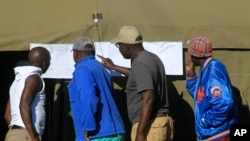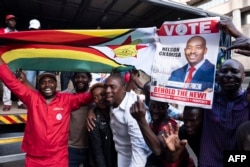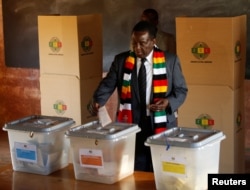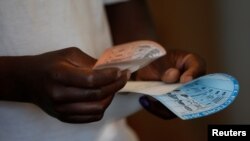Celebrations erupted on the streets of Zimbabwe's capital Harare Tuesday as opposition supporters marked what they said was a certain victory in Monday’s pivotal poll, the first in 38 years without long-time leader Robert Mugabe on the ballot. But official results have yet to be announced, and observers and the electoral commission have raised concerns about aspects of the campaign.
The poll was effectively a race between President Emmerson Mnangagwa and opposition challenger Nelson Chamisa.
However, the celebration was tinged with menace: a VOA reporter spotted five water cannon trucks, each loaded with police, making their way through central Harare, just a block away from the celebrations.
“We won’t be intimidated,” said opposition supporter Andrew Anthony, 32.
Although results had not been announced as of Tuesday evening, the two main rivals have already aired their views on social media after Monday’s poll. Chamisa tweeted Tuesday morning that his party was “winning resoundingly,” based on results they had collected from most of the more than 10,000 polling stations. Official results are expected by August 4.
“We have now received from our agencies across the country results of the 2018 election, the results show beyond reasonable doubt that we have won the election and that the next president of Zimbabwe is advocate Nelson Chamisa,” said party official Tendai Biti.
Also on Tuesday, President Mnangagwa called for caution on Twitter, urging Zimbabweans to “exercise responsibility and restraint by patiently waiting for ZEC to declare the official outcome.” But, he noted, “the information from our reps on the ground is extremely positive!”
All this talk, the largest local observer mission said, is worrying. The Zimbabwe Election Support Network, on Tuesday, praised the poll for being smooth and peaceful, but said such political sniping and rule-breaking could tarnish the poll. On Monday, the Zimbabwe Electoral Commission said it had reported two presidential candidates to police for campaigning outside of the allowed window, but the commission declined to name them.
“One of the main issues, which really is of concern to us, is the issue of hate speech in the period leading to elections. It’s something which the political players across the political divide must work on,” said network chairman Andrew Makoni. “…Again you saw that when ZEC indicated that campaigning was going by 12 midnight on Saturday, we saw campaigning continue on social media, we saw pressers being held, we also saw the president of ZANU-PF also appearing to continue with his campaign on Facebook which was also broadcast, I understand, on ZBC. So those issues are of concern to us. If we want to make our election management board look credible, we also must respect, in some way, their pronouncements.”
Lawrence Mhandara, a political science lecturer at the University of Zimbabwe, says this is a delicate moment for the nation, but said that the people showed maturity and a desire for calm. If anything happens, he says, the population won’t be to blame.
“I’m not sure how Zimbabweans will react to the results, but knowing how Zimbabweans are, they wouldn’t take that route,” he said. If there is any violence, this violence will be sponsored by those candidates who have lost. But in terms of the people, I don’t think they will go that far. Our political culture is one which is non-violent. The violence has always been sponsored by politicians, not by the people. So any violence that will come as a result of the outcome should be squarely, the blame laid on the politicians themselves and not the people.”















